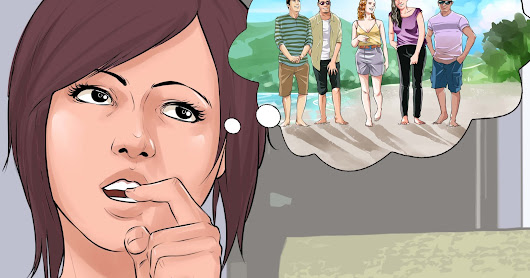As you get less sleep, it’s tempting to reach for an energy or caffeinated drink to stay awake during the day. Believe it or not, consuming these types of drinks to combat sleepiness, can lead to a vicious cycle.
Yes, caffeine will help you stay awake, but it can easily take up to eight hours to wear off. This means it can also reduce your sleep time and decrease the quality of your sleep.
So, how do can you stay awake naturally?
In one well-known study, Robert Thayer, PhD, a professor at California State University, Long Beach, studied whether people were more energized by eating a candy bar or taking a brisk 10-minute walk.
Though the candy bar provided a quick energy boost, participants were actually more tired and had less energy an hour later. The 10-minute walk increased energy for two hours. That’s because walking pumps oxygen through your veins, brain, and muscles.
If you work at a desk, get up frequently for short walks. At meal breaks, walk to a restaurant or, if you bring your lunch, head for a nice spot to eat it. Whether you take a walk outside or just in the building where you work, it will make you feel more alert and refreshed.
There are two things to remember about naps: Don’t take more than one and don’t take it too close to your bedtime.
“Nap between five and 25 minutes,” says Barry Krakow, MD, author of Sound Sleep, Sound Mind: Seven Keys to Sleeping Through the Night. It’s best to nap about six or seven hours before you would normally go to bed. If you must take a late nap close to bedtime, make it a short one.
Napping on the job can be touchy. If you need to nap at work, do it during your break and use a vibrating alarm clock, if necessary, to make sure it doesn’t spill over into your work time.
Sleeping at your desk is usually not a good idea, but many companies now provide nap rooms for employees.
“If you can’t nap, even resting quietly with your eyes closed for 10 minutes or so will help,” says Allison T. Siebern, PhD, a fellow at the Stanford University Sleep Medicine Center in Redwood City, Calif.
Continuous fixation on a computer screen can cause eyestrain and worsen sleepiness and fatigue.
Look away from the screen for a few minutes periodically to relax your eyes.
Sugary snacks give you a quick energy boost followed by the sugar “lows,” when low blood sugar produces mental fogginess and lethargy.
Snacks such as these will provide better overall energy in the long run:
If you’re fading fast, engaging in conversation can get your mind moving again. “Talk to a colleague about a business idea, politics, or religion,” says Krakow, medical director of Maimonides Sleep Arts and Sciences, Ltd. in Albuquerque, N.M. “It’s a very strong behavioral stimulator — especially when it’s a conversation about politics.”
“Talk to a colleague about a business idea, politics, or religion,” says Krakow, medical director of Maimonides Sleep Arts and Sciences, Ltd. in Albuquerque, N.M. “It’s a very strong behavioral stimulator — especially when it’s a conversation about politics.”
Environments with dim lighting aggravate fatigue. Studies have shown that exposure to bright light can reduce sleepiness and increase alertness. Try increasing the intensity of your light source at work.
Deep breathing raises blood oxygen levels in the body. This slows your heart rate, lowers blood pressure, and improves circulation, ultimately aiding mental performance and energy.
The idea of deep-breathing exercises is to inhale to the abdomen, not the chest. You can do them at your desk. Sitting up straight, try this exercise up to 10 times:
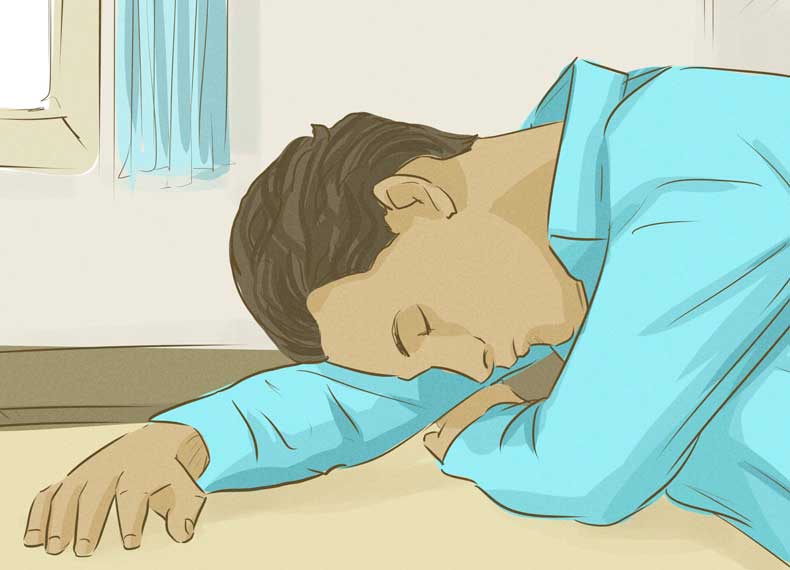 Your chest should not move.
Your chest should not move. Another technique, called stimulating breath, is used in yoga for a quick energy boost and increased alertness:
“Driving while sleepy is as dangerous as driving under the influence of alcohol,” says Siebern. Common tricks such as opening the windows and turning on loud music won’t keep you awake for very long behind the wheel. “Have someone else drive or pull off the road and take a nap until you’re no longer sleepy,” Siebern says.
If you’re on an extended trip, change drivers often. Stop at least every two hours to take a walk and get some fresh air.
In 2004 Finnish researchers who studied people working 12-hour night shifts found that monotonous work is as harmful as sleep loss for alertness.
At work or home, try to reserve more stimulating tasks for your sleepy times. Or switch to more engaging work responsibilities when you feel yourself nodding off.
Dehydration can cause fatigue. Make sure you drink plenty of fluids and eat foods high in water such as fruits and vegetables.
Our circadian rhythms, which regulate our sleep-wake cycle, are influenced by daylight. Try to spend at least 30 minutes a day outside in natural sunlight. (Sleep experts recommend an hour of morning sunlight a day if you have insomnia.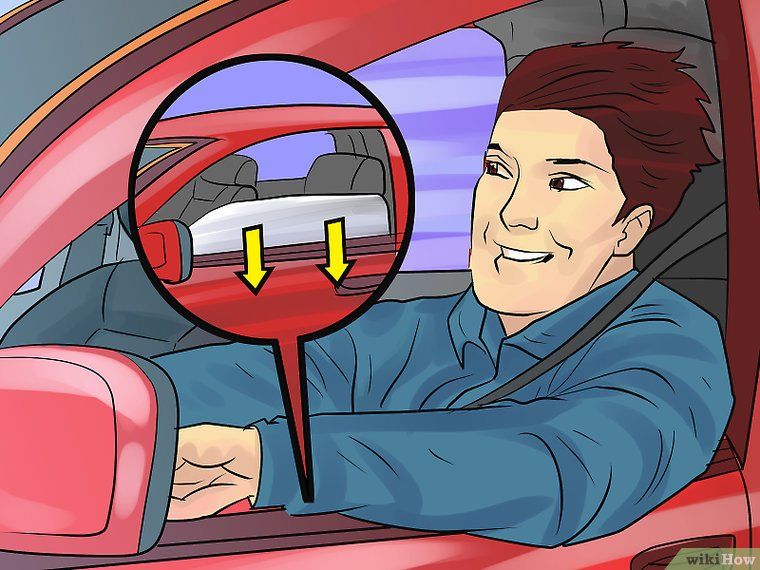 ) Even a step outside for a breath of fresh air will revive your senses.
) Even a step outside for a breath of fresh air will revive your senses.
In a 2006 analysis of 70 studies involving more than 6,800 people, University of Georgia researchers found that exercise was more effective in increasing energy and reducing daytime fatigue than some medications used to treat sleep problems.
Regular exercise also improves quality of sleep. Try to exercise 30 minutes a day.
If you decide to exercise hard some days, your energy level may drop for a bit and then surge for a few hours.
Eating a meal that contains both protein and carbohydrates within two hours after a heavy workout will lessen the initial energy loss. Be sure to finish your workout a few hours before bedtime so you are not energized when you try to sleep.
The team at Salem Health is here for you. Call our Sleep Center providers today!
Written by Camille Peri
With more and more of us getting less and less sleep, it’s tempting to reach for an energy drink or an espresso when we feel sleepy at work. But consuming caffeine to combat sleepiness can lead to a vicious cycle.
But consuming caffeine to combat sleepiness can lead to a vicious cycle.
The java jolt that helps you stay awake can take up to eight hours to wear off. Caffeine can also reduce your sleep time, alter the normal stages of sleep, and decrease the quality of your sleep.
How can you stay awake naturally? The most obvious thing is to get enough sleep and practice good sleep habits, sometimes called "sleep hygiene." For instance, you probably know that it's best to go to sleep ad get up at the same time every day, power down your screens ahead of bedtime, keep your bedroom dark and cool. You need to do that for good health, as well as feeling rested. But on the occasional day when that doesn't happen, try some of these 12 jitter-free tips to take the edge off sleepiness.
In one well-known study, Robert Thayer, PhD, a professor at California State University, Long Beach, studied whether people were more energized by eating a candy bar or taking a brisk 10-minute walk.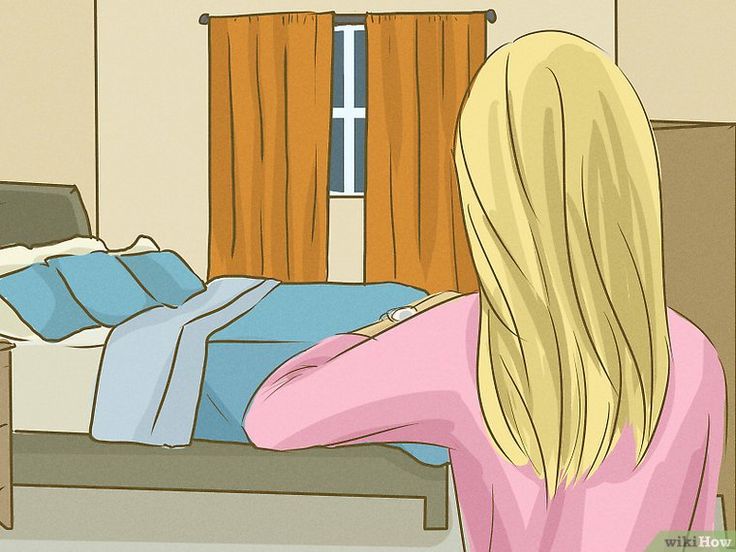 Though the candy bar provided a quick energy boost, participants were actually more tired and had less energy an hour later. The 10-minute walk increased energy for two hours. That’s because walking pumps oxygen through your veins, brain, and muscles.
Though the candy bar provided a quick energy boost, participants were actually more tired and had less energy an hour later. The 10-minute walk increased energy for two hours. That’s because walking pumps oxygen through your veins, brain, and muscles.
If you work at a desk, get up frequently for short walks. At meal breaks, walk to a restaurant or, if you bring your lunch, head for a nice spot to eat it. Whether you take a walk outside or just in the building where you work, it will make you feel more alert and refreshed.
There are two things to remember about naps: Don’t take more than one and don’t take it too close to your bedtime. “Nap between five and 25 minutes,” says Barry Krakow, MD, author of Sound Sleep, Sound Mind: Seven Keys to Sleeping Through the Night. It’s best to nap about six or seven hours before you would normally go to bed. If you must take a late nap close to bedtime, make it a short one.
Napping on the job can be touchy. If you need to nap at work, do it during your break and use a vibrating alarm clock, if necessary, to make sure it doesn’t spill over into your work time. Sleeping at your desk is usually not a good idea, but many companies now provide nap rooms for employees.
If you need to nap at work, do it during your break and use a vibrating alarm clock, if necessary, to make sure it doesn’t spill over into your work time. Sleeping at your desk is usually not a good idea, but many companies now provide nap rooms for employees.
“If you can’t nap, even resting quietly with your eyes closed for 10 minutes or so will help,” says Allison T. Siebern, PhD, a fellow at the Stanford University Sleep Medicine Center in Redwood City, Calif.
Continuous fixation on a computer screen can cause eyestrain and worsen sleepiness and fatigue. Look away from the screen for a few minutes periodically to relax your eyes.
Sugary snacks give you a quick energy boost followed by the sugar “lows,” when low blood sugar produces mental fogginess and lethargy. Snacks such as these will provide better overall energy in the long run:
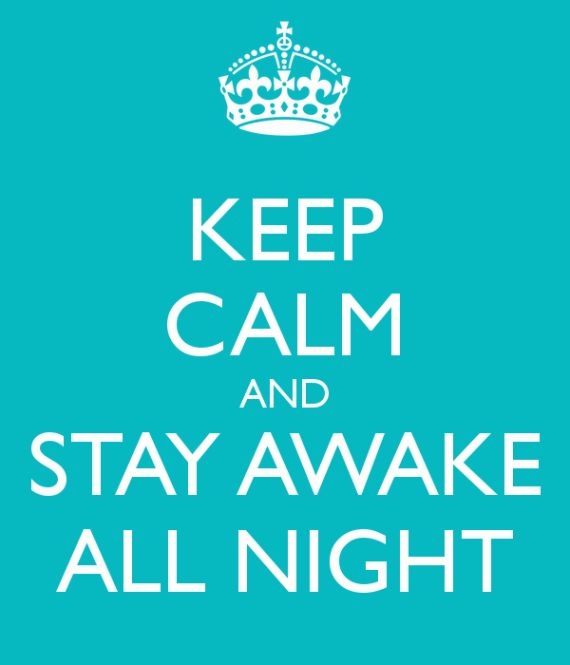 Start a Conversation to Wake Up Your Mind
Start a Conversation to Wake Up Your MindIf you’re fading fast, engaging in conversation can get your mind moving again. “Talk to a colleague about a business idea, politics, or religion,” says Krakow, medical director of Maimonides Sleep Arts and Sciences, Ltd. in Albuquerque, N.M. “It’s a very strong behavioral stimulator -- especially when it’s a conversation about politics.”
Environments with dim lighting aggravate fatigue. Studies have shown that exposure to bright light can reduce sleepiness and increase alertness. Try increasing the intensity of your light source at work.
Deep breathing raises blood oxygen levels in the body. This slows your heart rate, lowers blood pressure, and improves circulation, ultimately aiding mental performance and energy.
The idea of deep-breathing exercises is to inhale to the abdomen, not the chest. You can do them at your desk. Sitting up straight, try this exercise up to 10 times:
 Your chest should not move.
Your chest should not move.Another technique, called stimulating breath, is used in yoga for a quick energy boost and increased alertness: Inhale and exhale rapidly through your nose, keeping your mouth closed but relaxed. Make your in-and-out breaths short -- do about three of each cycle in a second. Then breathe normally. You can do this for up to 15 seconds the first time and then add on five seconds each time after until you reach a minute.
“Driving while sleepy is as dangerous as driving under the influence of alcohol,” says Siebern. Common tricks such as opening the windows and turning on loud music won’t keep you awake for very long behind the wheel. “Have someone else drive or pull off the road and take a nap until you’re no longer sleepy,” Siebern says.
If you’re on an extended trip, change drivers often.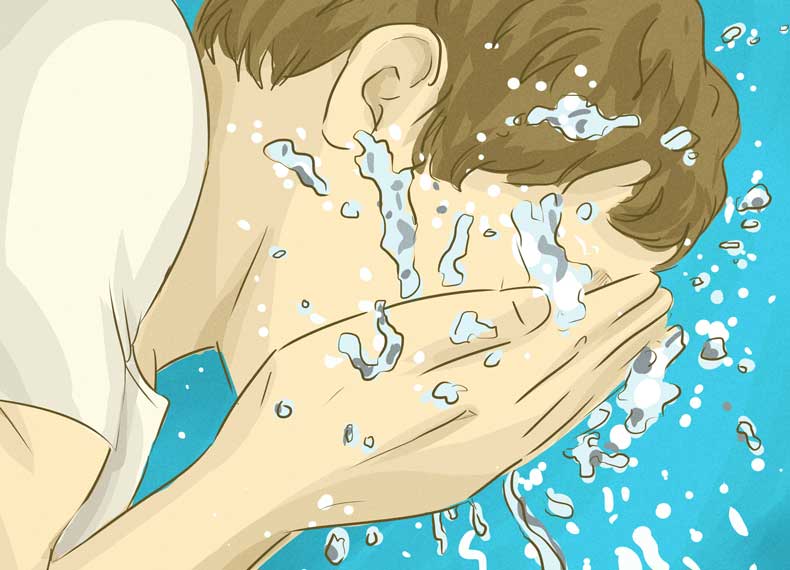 Stop at least every two hours to take a walk and get some fresh air.
Stop at least every two hours to take a walk and get some fresh air.
In 2004 Finnish researchers who studied people working 12-hour night shifts found that monotonous work is as harmful as sleep loss for alertness. At work or home, try to reserve more stimulating tasks for your sleepy times. Or switch to more engaging work responsibilities when you feel yourself nodding off.
Dehydration can cause fatigue. Make sure you drink plenty of fluids and eat foods high in water such as fruits and vegetables.
Our circadian rhythms, which regulate our sleep-wake cycle, are influenced by daylight. Try to spend at least 30 minutes a day outside in natural sunlight. (Sleep experts recommend an hour of morning sunlight a day if you have insomnia.) Even a step outside for a breath of fresh air will revive your senses.
In an analysis of 70 studies involving more than 6,800 people, University of Georgia researchers found that exercise was more effective in increasing energy and reducing daytime fatigue than some medications used to treat sleep problems.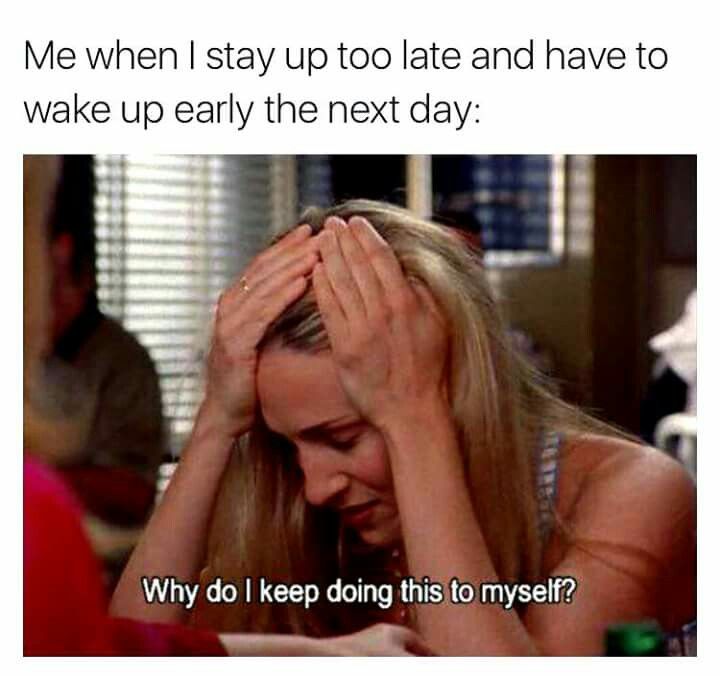 Regular exercise also improves quality of sleep.
Regular exercise also improves quality of sleep.
Try to exercise 30 minutes a day. If you decide to exercise hard some days, your energy level may drop for a bit and then surge for a few hours. Eating a meal that contains both protein and carbohydrates within two hours after a heavy workout will lessen the initial energy loss. Be sure to finish your workout a few hours before bedtime so you are not energized when you try to sleep.
If you find that you can’t stop nodding off when you need to be alert, consult a doctor or sleep specialist. You may have an underlying sleep disorder such as excessive sleepiness or narcolepsy, which can be treated. Your doctor may prescribe medications to help you with a sleep disorder. If you have trouble falling asleep because of stress or other reasons, cognitive behavioral therapy can help you develop good sleep habits and relieve sleep anxieties.
October 1, 2020Tips
Discomfort, coffee with chocolate and trolling will help you stay awake until the morning.
Share
0 You can listen to this article. If it's more convenient for you, turn on the podcast.
Getting ready for bed usually involves a sequence of activities: putting on pajamas, drinking milk, reading a book. For ordinary days, this is an advantage: the body immediately understands that now you are going to bed. If you need to stay awake, these habits are best avoided.
Being slightly hungry will keep you awake, as you are supposed to be active in order to get your own food.
Do not change into pajamas, even if they are very comfortable. Wear something you can't sleep in, like brand new, unworn jeans. Another helper will be shoes with laces. It will not give you the opportunity to "just lie down for five minutes." Unless, of course, you are used to falling asleep in your shoes every Friday.
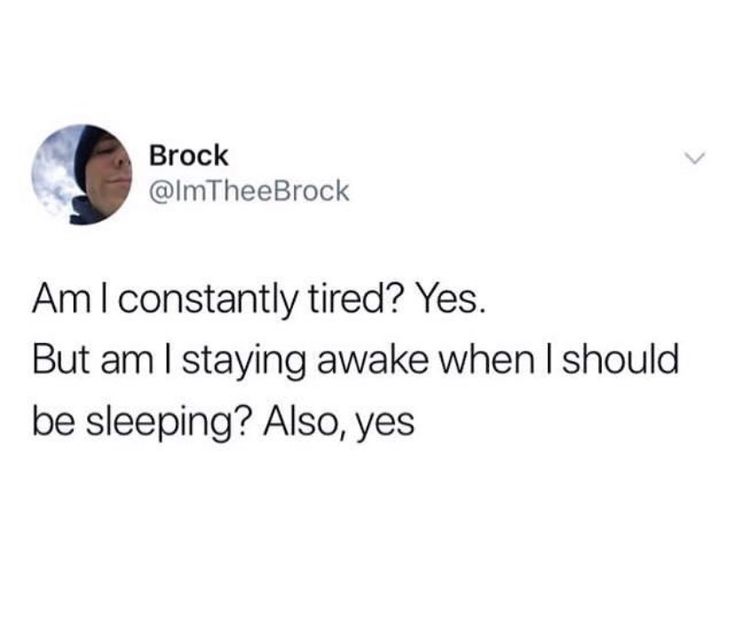 Avoid sofas and beds
Avoid sofas and beds If you really want to sleep, you will fall asleep even on a hard chair with nails sticking out in some places. A soft bed will not leave you a single chance to hold out until the morning. Therefore, choose not the most comfortable seats.
Studies have shown that bright light suppresses drowsiness. Turn on the overhead light, sconce, table lamp. It is impossible to overdo it in this matter. True, you should not pull this trick at parties: other visitors to a nightclub may be dissatisfied with the lights suddenly turned on.
Find a person with a questionable position on Facebook* and try to convince him. You can sincerely argue or frankly troll, but the effect will be the same: from indignation, you will not only fall asleep - you will not be able to sit still.
Not the most unexpected, but working way.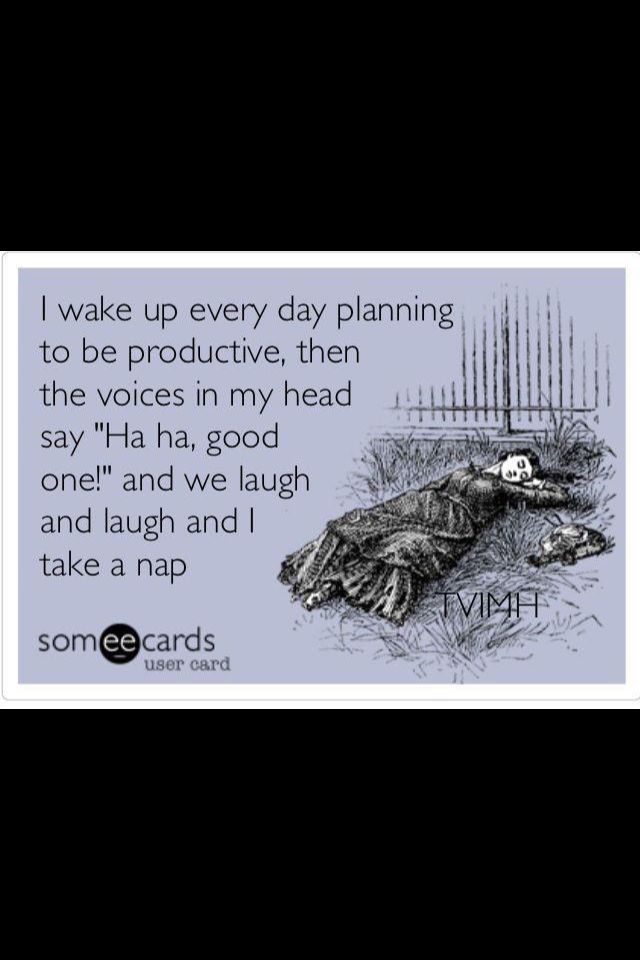 A sleepless night the day before leaves you virtually no chance to be productively awake. Unless, of course, you flew from the future to save John Connor. Therefore, before a strategically important night, sleep as hard as you can.
A sleepless night the day before leaves you virtually no chance to be productively awake. Unless, of course, you flew from the future to save John Connor. Therefore, before a strategically important night, sleep as hard as you can.
Caffeine does suppress sleepiness. True, there are nuances of drinking coffee, depending on how you want to spend the morning. If you drink it too actively, there is a risk that you will be too alert even when it's time to go to bed. If you drink just a little bit of coffee, you will easily fall asleep when the caffeine leaves your bloodstream.
Instead of trying to pinch yourself to stay awake, outsource this activity. Eat a portion of spicy, burning food. It will irritate the mucous membrane in your mouth enough to make you forget about sleep.
On a sleepless night, just the property of fast carbohydrates that adherents of a healthy diet scold them for is useful: they quickly break down into simple sugars and provide a strong, albeit short-term burst of energy.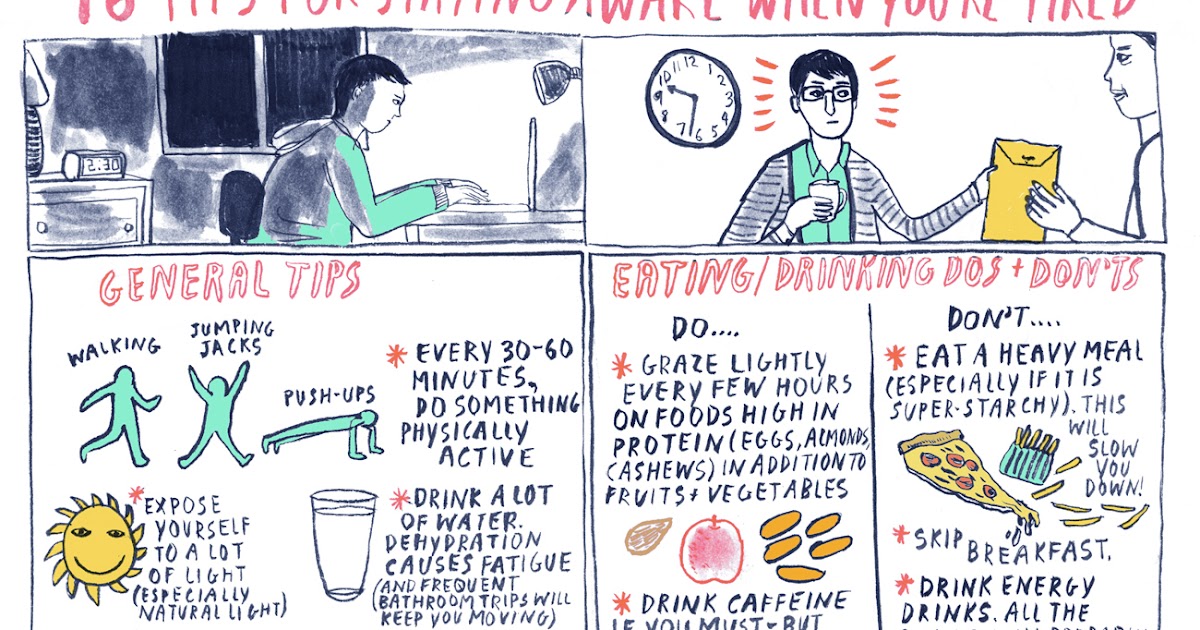 So ignore the advice of grandmothers "do not eat sweets at night, otherwise you will not fall asleep" and stock up on sweets.
So ignore the advice of grandmothers "do not eat sweets at night, otherwise you will not fall asleep" and stock up on sweets.
Keep an eye on your level of fatigue, as the energy will leave your body just as quickly: as soon as you feel tired, it's time to take another bite from the chocolate bar.
Rinse face and wrists. Cold water is a kind of stress for the body, and therefore it will inevitably cheer up to eliminate discomfort.
Research has shown that chewing will keep you awake. The brain receives a signal that food is on its way to the stomach, and does not allow the body to relax in anticipation of a portion of energy. In general, you can chew anything, but chewing gum will be a longer-lasting option than food.
Dehydration can lead to fatigue, so listen carefully to your body's signals of thirst. The advice has an added bonus: Have you ever tried to sleep with a full bladder?
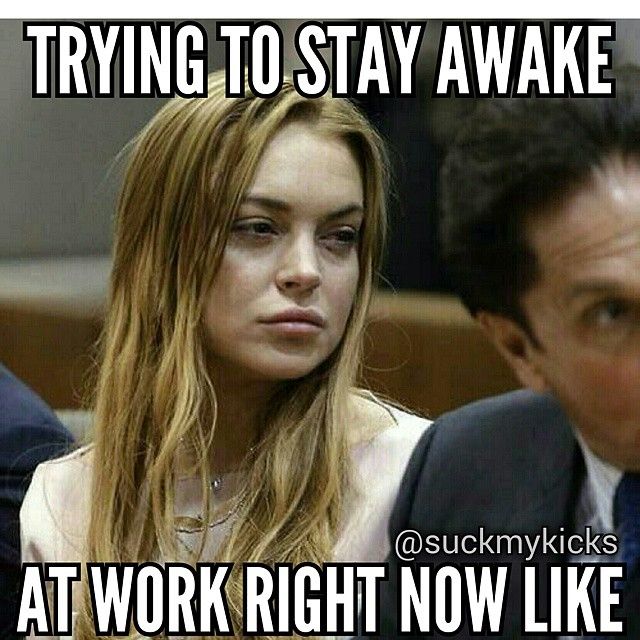 Squat
Squat Physical activity is invigorating, and if you get up every hour and do 15 squats or push-ups, this will significantly extend the period of wakefulness. But jumping is better to avoid, although communication with the police squad, which the neighbors will call because of the noise, can invigorate better than any squats.
Surely there are puzzles that make you forget about everything in the world. For some, these are puzzles, for others - a new level of computer games. If you choose a movie or game, it is better that they are new to you and that you have to carefully follow the twists and turns of the plot.
A sleepless night is a great time to practice multitasking. Switch between different tasks to avoid switching to automatic work mode.
What methods do you use? Share in the comments.
Read also 🧐
*Activity of Meta Platforms Inc. and its social networks Facebook and Instagram are prohibited in the territory of the Russian Federation.
and its social networks Facebook and Instagram are prohibited in the territory of the Russian Federation.
Komsomolskaya Pravda
Healthiness of medicine -sized: Help yourself
Anna Gerasimenko
5 December 2014 6:00
What will help us wake up and be active during the day
,photos: Global look Press
at 8 in the morning still dark dark . Every morning you think, probably, the alarm clock is broken - in the middle of the night it rings. Getting used to the dark winter rise is difficult, because our body “wakes up” from the light, from the sun. In addition, we sleep little, do not get enough sleep, we want to do everything in the world, but there is not enough time for rest. How to wake yourself up if you feel tired and sleepy during the day?
1. The magic of daylight
Natural lighting is a great help to the body that cannot wake up. After all, in daylight, melatonin, the hormone that causes sleep, ceases to be produced. Natural light wakes up and improves mood. So open the curtains, go out during the day from the office, from the house to the street - just walk in the daylight. If the sun is shining, catch every ray. In winter, we are especially deficient in vitamin D, and only sunlight in contact with our skin can help produce it.
After all, in daylight, melatonin, the hormone that causes sleep, ceases to be produced. Natural light wakes up and improves mood. So open the curtains, go out during the day from the office, from the house to the street - just walk in the daylight. If the sun is shining, catch every ray. In winter, we are especially deficient in vitamin D, and only sunlight in contact with our skin can help produce it.
2. More water
When we lack fluids, we become dehydrated, which makes us feel tired and lose energy. So if you fall asleep on the go, drink more water. But not coffee and sweet sodas, namely simple drinking cool water.
3. Proper food
Food can also put us to sleep and wake us up. To wake up, do not skip breakfast. And for lunch, do not eat fatty foods. Eat often and in small portions, the best option is foods rich in proteins. But it is better to avoid energy drinks and caffeine, they will not only not help, but can only harm, accelerating the work of a sleepy heart.
4. Movement is life
If you sit in one position, you will want to sleep even more. Walk. Get moving. If possible, do exercises, stretch all parts of the body - twist your neck, do side bends, squats, straighten your shoulders. If there is nowhere to do exercises, go for water or walk up the stairs to colleagues on other floors.
5. Inhale-exhale
Breathing in the stomach will help you wake up and cheer up. Inhale and exhale through the nose, "inflating" the air, and then "deflate" the stomach. Gradually speed up the inhalations, exhalations and movements of the stomach.
6. Music
Do not listen to calm relaxing music - you will fall asleep completely. You will be shaken by a rhythmic melody, to which you want to dance, and your foot stomps to the beat. Turn up the volume - Latin rhythms, pop music - what is usually played in discos and fitness classes.
7. Breaks
Find an excuse to take a break every 30 minutes.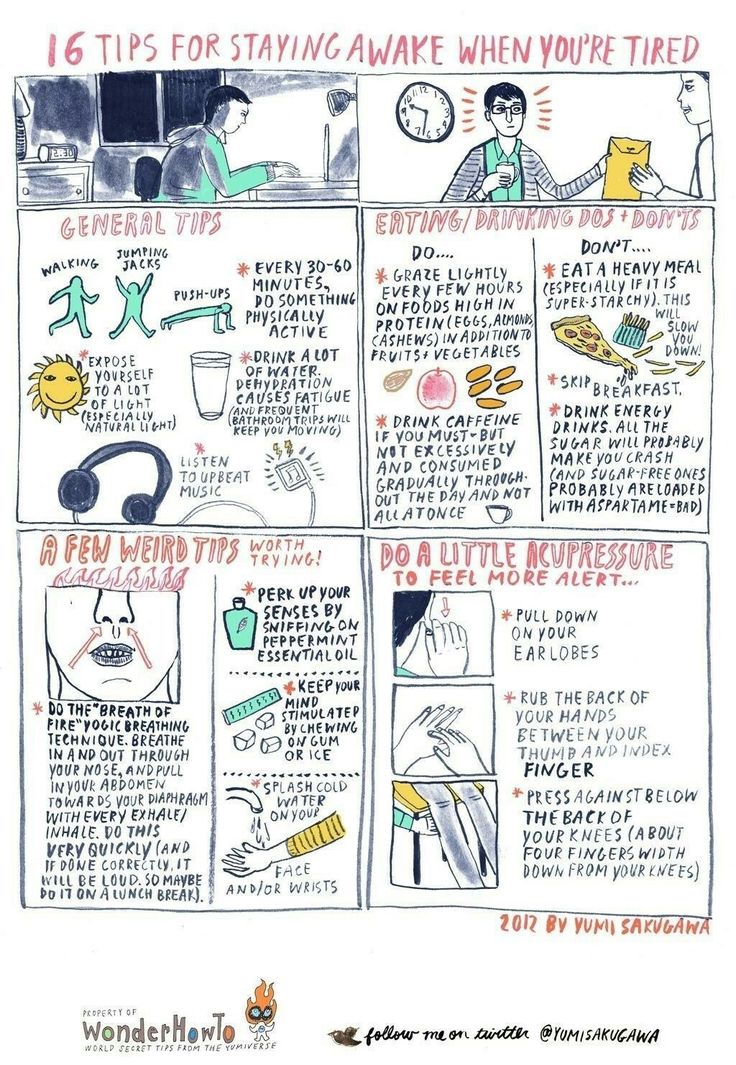 Clean up the desk, go to other rooms (if you are in the office). Get up and stretch your legs and arms. This will help the blood circulation to "keep up", the blood will run faster, and the body will become active.
Clean up the desk, go to other rooms (if you are in the office). Get up and stretch your legs and arms. This will help the blood circulation to "keep up", the blood will run faster, and the body will become active.
8. Fresh air
The sleepy brain needs oxygen to be active. If you can, take a walk or just open the window and take a deep breath. If you fall asleep in the car, put on a hat and open the window for a while.
9. Wash your face
Take a shower in the morning. If you can stand under contrast, you are a hero. If not, then pour cold water over at least your legs and arms. Wow! And wake up immediately. During the day, you can simply wash your face with cold water several times - this will wake you up and improve your complexion.
10. Stirlitz's dream
Sometimes you want to sleep so much that you can't fight yourself. Well, don't fight. Find an opportunity and close your eyes - at least for 10-15 minutes.